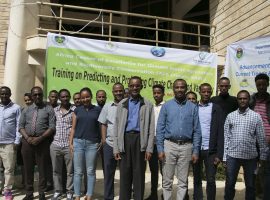Africa Center of Excellence for Climate Smart Agriculture and Biodiversity Conservation (ACE Climate SABC) at Haramaya University has successfully organized a Five Days Training on predicting and projecting climate change and variability.
The Deputy Leader of ACE Climate SABC, Dr. Bobe Bedadi has opened the training by warmly welcoming the participants of the training. In his speech he has addressed that the Africa Center of Excellence has been giving different short-term trainings on various areas of fields, knowledge, and skills related to Climate Smart Agriculture and Biodiversity Conservation since 2018. Accordingly, to date, the Center has successfully delivered trainings on food security, climate change, ecosystems, biotechnology, information and digital literacy, waste management, green house gas emission and mitigation, scientific writing and on integrated decision support systems focusing on three different models namely Agricultural Policy Environmental eXtender Model (APEX), Farm Income Simulator Model (FARMISM) and Soil and Water Assessment Tool (SWAT).
He also added that the current training on predicting and projecting climate change and variability is believed to be relevant and timely as climate change is increasingly becoming a worldwide problem and agenda, for which updating staff and post graduate students in such areas is very important at this point in time. He also asserted that the Center has a plan to organize skill based short courses in climate change and agriculture, to establish climate data base to provide up dated information on climate change, establish a digital platform for resource sharing among stakeholders, to revise the existing curriculum and to stablish CSA model village to continually serve as a regional hub in a academic and research in the areas of climate change and agriculture in the future.
The training on predicting and projecting climate change & variability was focused on basic concept of climate change, climate variability and analysis, climate scenarios and data sources, regional climate and basic concepts of climate downscaling with basic models that would support the topics of training. A total of 16 participants of the training are mainly graduate students of ACE Climate SABC, staff from the college of agriculture and school of geography and GIS. According to the participants, having training on the issue of climate change is a good opportunity that they had at this time and the way it has been organized and fully handled by the trainer was so exceptional. The trainees expressed that they were very happy to the whole aspects of the training.
On the closing session, Dr. Mulugeta Damie, a project manager of ACE climate SABC said that the Center will plan another round for the training on this topic since there were many more applicants who didn’t get the opportunity of the training in this round. We were also more confident about our Trainer Dr. Asfaw Kebede, since he is our colleague and faculty member, we know the capacity and personal qualities and we believe that he has already met our expectation. The deputy center leader, Dr. Bobe also advised the trainees that they must have enjoyed the training and they need to practice what they have trained in their research work in stead of putting them aside, underlining that it would be forgotten otherwise.
